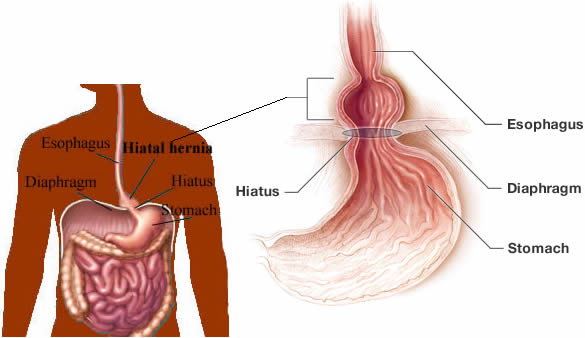Hernia is a condition in which your internal part of the body, such as organ or fatty tissue, squeezes through an opening or a weak spot of muscle /connective tissue (fascia). Treatment can vary, depending on the severity of the disease. Some lifestyle measures have an effect, too. Quitting smoking if you’re a smoker, for example, can help a lot to prevent the problem from worsening. How about alcohol? Is it still OK to drink with hernia?
Hiatal hernia
There are a number of different types of hernias – one of them is hiatal hernia, an abnormal condition that occurs when part of the stomach bulges through an opening in the diaphragm called ‘hiatus’. Hiatus is a normal hole where the esophagus (food tube) passes and connects to the stomach.
The stomach can sometimes pushes upward and causes a hernia through hiatus. This problem is more likely to occur when you have weakness in the muscles surrounding the hiatus.
Other factors that may cause hiatal hernia are as follows:
- Having abnormal large hiatus (birth abnormality).
- Injury that affects the hiatus area.
- Intense, persistent extra pressure that hits muscles surrounding the hiatus such as chronic coughing, frequent lifting heavy object, and excessive straining during bowel movements.
- Obesity and age may have an effect, too. In fact the disease is common in obese people and more common in adults age 50 /older.
Typically, a small hiatal hernia doesn’t bother you a lot and you don’t have any symptom. But if it gets larger, this can cause a number of symptoms and discomforts. For example, a large hernia can cause heartburn by allowing food and more acid to flow back into your food tube.
Some home remedies and non-surgical treatments can help soothe and relieve the symptoms. But if the hernia has become very large, surgery is required. The good news, there is only a small number of cases that require surgery.
GERD (gastroesophageal reflux disease)
It is a chronic digestive disorder in which what you find in your stomach (especially stomach acid, or sometimes stomach content) back up into the esophagus. This frequent acid reflux can also irritate the lining of your esophagus.






Well i never knew i had a abdominal hernia until the doctor recently told me. So apparently i have had this hernia for a long time now.
Now i stopped drinking hard alcohol or or any type of alcoholic drinks because for no reason after drinking one, i would have the worst stomach ache that would last for 1/2 hour to an hour or longer if i didnt drink water. It was easily a 10/10 on the pain meter. When the pain would start i would have to consume large amounts of water to lesson the pain to an area where i can actually move around again. This would take a while to finally make the pain go away. I also had a similar reaction when i drank a fruit punch drink from a fast food place. So alcohol on the hernia is pure pain, sugar drinks with lots of syrup also make it hurt bad. Then i tried my luck with a margarita last month, and same thing, so painful i couldnt move from the restaurant and kept ordering more and more water….. oh and lastily beer was ok to drink without having any problems, just not hard alcoholic drinks. I stopped drinking a long time ago, in case anyone thinks im an alcoholic, i never have been one and i only drank on the weekends with friends and that was just casual. I was told by my doctor that i should leave my Hernia alone as any type of surgery would make my stomach even worse. Can anyone confirm that? Should i get surgery to fix it? is Surgery even an answer? Any help is appreciated